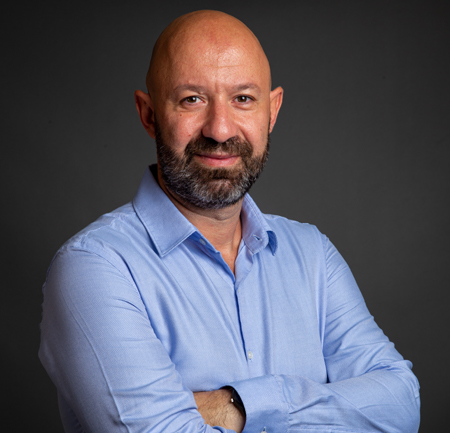
Caring for the vulnerable

Dr. Alexandros Argyriadis, Head of the Department of Nursing, emphasizes the importance of Community Health Care and underscores the pivotal role of Health Professionals
While healthcare is often associated with medical treatments and hospitals, it encompasses far more than just the treatment of illnesses. Community health is an integral component of healthcare focusing on the promotion of well-being and the prevention of diseases within the communities where individuals live and work. In recent years, community health care has gained increasing recognition among healthcare professionals and policymakers who underscore the significance of preventative and community-centered healthcare approaches.
In his insightful interview, Dr. Argyriadis, Head of the Department of Nursing at the University's School of Health Sciences, sheds light on the role of community health care and the contribution of healthcare professionals in advancing and promoting it. Furthermore, he delves into the current challenges and outlines the necessary steps to address them.
“Community Health Care revolves around proactively promoting health and preventing diseases within a given community. When we refer to communities, we include healthy population groups as well as the vulnerable, including refugees, people with disabilities, the LGBTQI+ community, religious minorities, and many more. This approach considers the multifaceted social, economic, and environmental factors that affect health outcomes. By working within a community, we can identify its specific needs and challenges, facilitating the development of customized interventions to address them. This methodology leads to a more comprehensive and effective healthcare delivery system” says Dr Argyriadis, who coordinates the postgraduate program in Community Health Care. “Our University actively engages in programs and initiatives to promote community health care and well-being. For example, our nursing students work with local organizations to provide health education and screenings for underserved populations. We also participate in research programs that focus on identifying and addressing health disparities in the community. Furthermore, we offer a postgraduate program in Community Health Care that prepares students to become leaders in this field.”
How are students equipped to excel in this field? As Dr Argyriadis explains, “The MSc in Community Health Care offered by Frederick University is designed to provide students with the knowledge and skills needed to address the complex health challenges communities face today. The program covers a range of topics, including health promotion, community assessment, program planning and evaluation, and health policy. Students also have the opportunity to engage in research and fieldwork to gain practical experience in the field.”
Communities face several challenges when it comes to healthcare, including access to care, affordability, and cultural barriers. Community health care professionals play a critical role in addressing these challenges by providing culturally competent health care professionals and working to remove barriers to access. This can involve providing education to community members about available healthcare services, working with local organizations to provide affordable healthcare options, and developing tailored programs that address specific health needs within the community.
Community Health Care is a relatively new concept in Cyprus, and there is still a lack of understanding about its importance and potential benefits. As Dr Argyriadis notes, “one of the main challenges Cyprus faces is limited funding and resources, which can make it difficult to establish and sustain community health care programs. However, there is a growing recognition of the importance of preventative care and community-based services, and we are working to educate policymakers and the public about the benefits of investing in these areas. By increasing awareness and support for community health care, we can help promote its growth and improve health outcomes in our communities.”
So how have community health care professionals made a significant impact on communities? “One example is the work of community health workers in reducing health disparities among underserved populations”, says Dr Argyriadis, explaining that these professionals work to bridge the gap between healthcare providers and the communities they serve, providing culturally competent care and helping community members navigate the healthcare system. This has proven to improve health outcomes and reduce healthcare costs in communities across the country.
Asked about the significant shortage of nurses worldwide and how this affects the provision of community health care services, Dr Argyriadis notes: “The shortage of nurses is a global issue that affects all areas of healthcare, including community health care. In many cases, this shortage leads to increased workloads and burnout for the existing nursing staff, which can negatively impact the quality of care provided. One solution is to increase recruitment efforts and offer incentives for individuals to pursue nursing careers. Additionally, investing in continuing education and professional development programs can help retain current nursing staff and improve the overall quality of care.”
Commenting on the future role of community health care, Dr Argyriadis notes that it will continue to be pivotal in improving health outcomes and reducing health disparities. “As we confront new challenges, such as the COVID-19 pandemic, it is crucial to adapt and evolve our approach to healthcare delivery. This may involve incorporating new technologies and strategies, such as telehealth and community-based participatory research. Ultimately, the overarching goal of Community Health Care will remain the same - to promote health and well-being in the community through collaborative and comprehensive approaches” Dr Argyriadis explains.
Last but not least, we asked Dr Argyriadis what motivates him to work in this field. “Community health care addresses the health needs of communities as a whole, rather than just focusing on individual patients. This approach recognizes the social determinants of health and the role that social and economic factors play in shaping health outcomes. Consequently, working in this field allows me to make a difference in the lives of entire communities, and to work towards creating a healthier, more equitable society. It is a challenging and rewarding field, and I am proud to be serving it through academia”.

